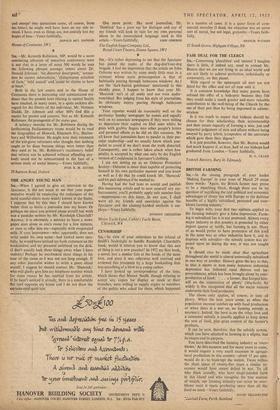SIR,—In the closing paragraph of your leader 'Making Europe' in
your issue of March 29 occur these words: 'Again, the British farmer may prove to be a stumbling block, though there can be no question of sacrificing the real political and economic advantages of closer ties with Europe to the dubious benefits of a highly subsidised, protected and over- blown farming industry.'
To begin with, your first two epithets applied to the farming industry give a false impression. Farm- ing is subsidised but it is not protected. Almost every major industry in this country is protected by either import quotas or tariffs, but farming is not. Many of ,us would prefer to have protection of this kind in the same way as other industries have it, and to dispense with subsidies—the subsidy system was im- posed upon us during the war, it was not sought by us.
It should also be made clear that agriculture throughout the world is almost universally subsidised in one way or another. History gives the key to this, in that it shows in how many instances industrial depression has followed rural distress and im- poverishment, which has been brought about by over-
production of food : . . a farmer, that hanged him- self on the expectation of plenty' (Macbeth). So widely is this recognised that all the major nations underwrite their food producers:
The hbove only applies, of course, in time of plenty, When the lean years come, as when the population increase catches up with food production or when there is a war on, no farming subsidy is necessary. Indeed, the boot is on the other foot and a consumer subsidy is usually applied to keep down the cost of food, plus price control of the farmer's products.
It can be seen, therefore, that the subsidy system, which you have attached to farming as a stigma, has its reason and its purpose.
You have described the farming industry as 'over- blown.' At this moment and for many years to come, it would require a very small recession in agricul- tural production in this country—about 15 per cent. would do it—to bankrupt the nation. Twice within the short space of twenty-five years a similar re- cession would have meant defeat in war. To all who think soundly, who have single-minded faith in this island and who recognise the true sources of wealth, our farming industry can never be over- blown until it starts producing more than all the food we need.—Yours faithfully, Farm, Perth, Scotland
DAVID YELLOW LEES


































 Previous page
Previous page